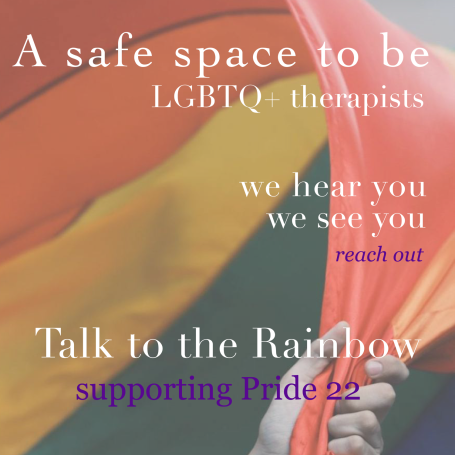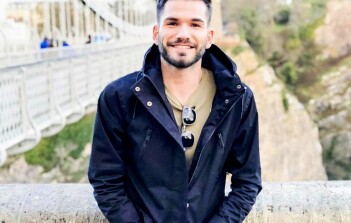
LGBTQ+ News and views
Why Pride is more important than ever for all

Summary: Current discourse in the public sphere contributes to a higher level of anxiety in LGBTQ+ people, even though society at large is becoming more accepting of the community. Thus, there is an increasing need of dedicated spaces for the community. Pride is such a space. Talk to the Rainbow supports Pride events and provides a safe space to be for LGBTQ+ people.
On 2ndJuly, London Pride achieved its highest turnout for the march, 50 years after the first London Pride, with the theme of #AllOurPride. A reminder for all people to come together and support each other in the LGBTQ + community.
Current news and political debates, particularly about trans people and gender identity, seem to be focused mainly on fostering division. This contributes to fuelling fear and feelings of social anxiety amongst many transgender individuals. How difficult this is when so many are still grappling with the painful emotional landscape that is gender dysphoria. Certainly, the younger generation growing up in a 24hour cycle of news and social media is getting extra affected with anxiety due to this.
Yet, social media and the way news headlines are delivered do not represent the more nuanced attitudes or the actual feelings amongst most people. For example, recent research published on 16 June 2022 by More in Common shows that the majority of people in Britain are not as polarised as is portrayed in the media and the public sphere. People are more empathic and are not opposed to equality for the trans community. This article in the Guardian is a useful analysis of the research.
Paradoxically, when society is becoming more compassionate and accepting of the LGBTQ+ people, the media and other voices tend to create an anxious environment for this community. Concurrently, there seem to be an erosion of places where LGBTQ+ can meet and feel safe. For example, at the same time as Pride London, Duckie one of the most established venues for LGBTQ+ people at the Royal Vauxhall Tavern in London closed after 27 years. Many other LGBTQ+ spaces have been lost in the last decade, and this means that places where LGBTQ+ feel safe to meet up are becoming less and less. To continue to support the LGBTQ+ community who experiences high level of anxiety, we need dedicated safe spaces more now than before.
So, we are pleased to be supporting some of the Southwest Pride events including in Bristol this coming weekend, to lend our visibility, support, and help, and to promote awareness of our therapy services by LGBTQ+ people or proven strong allies. We hope that by doing this, those who feel the need to talk will find the courage to reach out and talk to us.
The community coming together as a supportive collective, provides a chance by increasing our visibility, add a voice, and show real human beings behind the negative headlines. Self-harm and suicide are higher amongst the LGBTQ+ community – and we would like to break this cycle by reminding people not to stay isolated but to reach out and seek help. Talking it through in the safe space of therapy can make a positive difference.
Why talk to us?
We at Talk to The Rainbow are a team of LGBTQ+ therapists or strong allies. This service was set up to provide access to therapists who ‘get it’. We provide a safe non-judgemental support where people from the community feel they can be themselves. We understand that LGBTQ+ clients often come to therapy and do not want to have to ‘come out’ to a therapist in case it further compounds any shame or mis gendering that may occur. Whilst we know there are many good cis[i] heterosexual services out there who are more than capable, this is about making clients and people in need feel comfortable enough to make that vital and important first step in seeking help with their mental health. This also applies to family and friends who want to support their LGBTQ+ loved ones but struggle with this.
We understand the nuances and importance of the individual’s lived experience and have seen commonality in some of the themes that regularly get presented in therapy.
Some common themes we hear about and just some of the contributing factors.
Issues relating to what was experienced in growing up play a big part in developmental stages yet also more so when it comes to shame and internalised gay/trans phobia.
Not everywhere in UK or internationally is openly LGBTQ+ inclusive. Family dynamics and belief systems passed down from older generations or cultural or religious beliefs and values, can all add to the feeling of being an outsider and of not belonging. Family conflict and estrangement often occurs.
Kelly Holmes’s remarkable documentary entitled ‘Being Me’ is a poignant illustration of a painful journey towards coming out as gay. Having had what she described as a breakdown, she is now realising the importance of openly sharing her story in announcing her sexuality. It was clear that her experience of life in the army and the laws that were in force at the time, affected her greatly. Internal conflict about career and sexuality and how the laws were enforced created immense stress and trauma resulting in shame and limiting her ability to be truly authentic in her connections.
To not be able to live authentically and true to Self can cause many repercussions in all areas of life. The pressure of maintaining a false self in front of others can result in low self-esteem and confidence, lack of close friends and genuine close social connections. Intimate relationships suffer when one’s true self is hidden. Life becomes limiting and so too does its enjoyment.
Experiences of past bullying and fear of intimidation leading to potential conflict and harm can stop someone living life fully outside. Agoraphobia can develop, negative self-talk and views often take over and a person’s internal world becomes smaller and scarier. We see this a lot with those who have yet to transition fully and are stressfully awaiting help on a very limited service. Sometimes, even after transitioning these fears stay stuck in the psyche and nervous system causing anxiety and stress to reoccur.
We hear you! Please do reach out to us, Talk to the Rainbow is here for you.
Pauls is a therapist at Talk to the Rainbow
contact@talktotherainbow.co.uk
[i] Cis: Someone who is cis has a gender identity which fully correspond to the sex assigned to them at birth. Cis is short for 'cisgender'.

